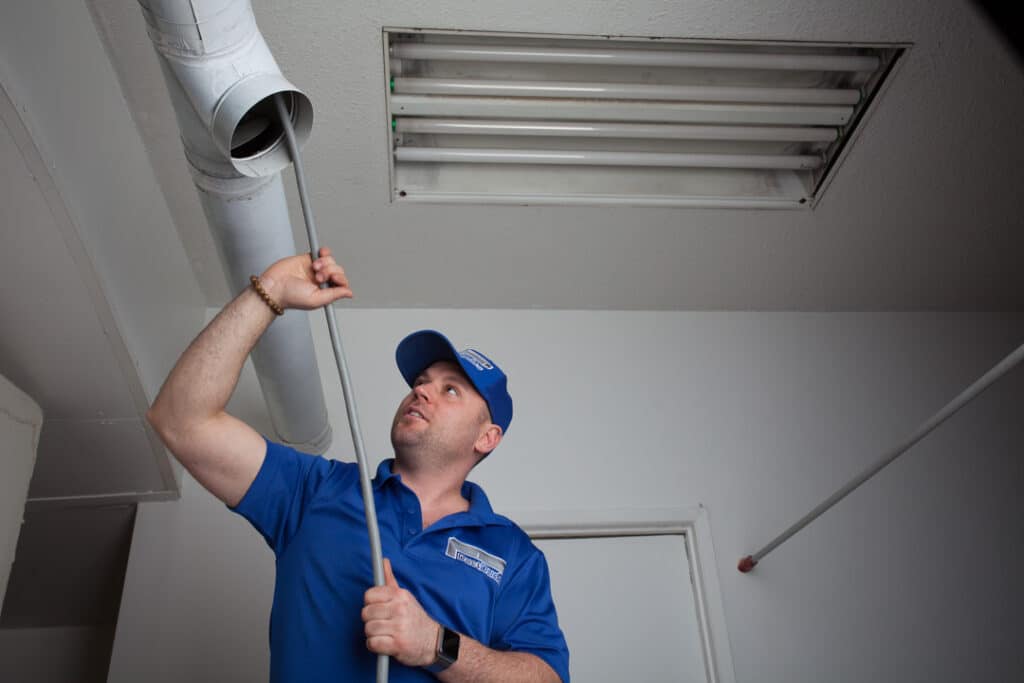Understanding how to control RH in HVAC systems is crucial for maintaining a comfortable and healthy indoor environment. Both homeowners and business owners need to pay attention to their HVAC systems to ensure they operate efficiently.
Relative Humidity (RH) determines the moisture level in the air. The right RH is essential for comfort, health, and efficient operation of the HVAC system. Too high or too low RH levels can cause several issues, including discomfort, health problems, and damage to your property.

Why is Relative Humidity Important in HVAC Systems?
Relative humidity significantly impacts indoor air quality and comfort. High RH can foster mold growth and encourage dust mites, while low RH can cause dryness in the air, affecting skin and respiratory health.
How Excess Moisture Affects Indoor Environment
Excess moisture in the air can make spaces feel hotter in summer and colder in winter. It can damage furniture, electronics, and even the structure of a building. In business settings, excess moisture can affect product quality and staff comfort.
Impact of Low Humidity on Health and Comfort
On the other hand, low RH can lead to dry skin, irritated eyes, and respiratory issues. It can also lead to static electricity, which might be hazardous, especially in businesses dealing with electronics.
Ideal RH Levels for Different Settings
Maintaining the ideal RH levels is vital to ensuring optimal comfort and health. Generally, the ideal RH level for homes and businesses should be between 30-50%.
Recommended RH Levels for Homes
In residential settings, keeping RH within 40-50% is advisable. This range prevents mold growth and maintains comfort.
Optimal RH for Office Spaces
For offices and commercial spaces, a bit lower range, around 30-45%, is often more comfortable and reduces issues with digital equipment.
Special Considerations for Sensitive Environments
Certain environments, such as hospitals and data centers, require more precise control of RH levels to protect equipment and ensure the health and safety of occupants.
Methods to Control RH in HVAC Systems
How to control RH in HVAC systems effectively? It involves several strategies, including proper HVAC system design, regular maintenance, and the use of dehumidifiers or humidifiers.
Using Dehumidifiers
Dehumidifiers can help reduce RH levels by removing excess moisture from the air. They are especially useful in areas with high humidity.
Integrating Humidifiers
Humidifiers add moisture to the air, beneficial in dry areas or during winter when heating systems can dry out the indoor air.
Proper HVAC System Design
An efficiently designed HVAC system can inherently control RH levels. Ensure proper sizing of HVAC units and consider systems with built-in humidity control features.
Best Practices for Maintaining Optimal RH Levels
Regular maintenance of your HVAC system is crucial to ensure it performs optimally in controlling RH levels.
Regular HVAC Inspections
Regular inspections help in identifying and addressing issues that could affect humidity control.
Cleaning the Ducts
Clean ducts are important for efficient HVAC operation. Dirty ducts can hamper airflow and affect moisture control. Learn more about duct cleaning to keep your system functioning well.
Sealing Duct Leaks
Leaky ducts can disrupt the balance of humidity in your building. Properly sealing ducts is vital to controlling RH levels.
Filter Replacement
Regularly replacing the air filters in your HVAC system ensures good airflow and helps maintain appropriate humidity levels.
Innovative Technologies for RH Control in HVAC Systems
With advancements in technology, there are now several innovative methods available for controlling RH levels in HVAC systems.
Smart HVAC Systems
Smart HVAC systems equipped with sensors and automation can continuously monitor and adjust RH levels to maintain optimal conditions.
Using IoT for Better Control
The Internet of Things (IoT)-enabled devices can provide real-time data and control over HVAC settings, allowing for precise RH control.
DIY Tips for Homeowners
For homeowners, there are several DIY methods to help control RH levels without complex systems.
Ventilation Improvements
Improving natural ventilation in your home can help manage humidity levels. Use exhaust fans in bathrooms and kitchens.
Using Plants
Houseplants can naturally regulate humidity levels, adding moisture to dry air and absorbing excess humidity.
Importance of Professional HVAC Services
While DIY methods are useful, professional HVAC services are crucial for ensuring your system functions efficiently.
Expert Inspections and Maintenance
HVAC professionals can provide thorough inspections and maintenance, ensuring your system effectively controls RH levels.
Specialized Cleaning and Adjustments
Professionals can perform specialized cleaning, such as with air ducts, and make necessary adjustments to enhance humidity control.
You may visit this professional service for expert advice and services.
Commercial HVAC Services
For businesses, commercial HVAC services ensure systems are up to the task of controlling humidity in larger spaces.
Regular Maintenance Contracts
Consider setting up a regular maintenance contract with an HVAC service provider to ensure ongoing performance and RH control.
For more information, check out this commercial duct cleaning resource.
Future Trends in HVAC Systems and RH Control
The future of HVAC systems is promising, with new technologies constantly emerging to improve RH control.
Energy-efficient Systems
Advancements i n energy efficiency ensure that HVAC systems provide effective RH control without consuming excessive energy.
n energy efficiency ensure that HVAC systems provide effective RH control without consuming excessive energy.
Sustainability Considerations
Sustainable HVAC solutions focus on reducing environmental impact while maintaining optimal indoor conditions.
FAQ
Q: Why is controlling RH important in HVAC systems?
A: Controlling RH is essential for maintaining comfort, health, and protecting property from damage.
Q: What is the ideal RH level for homes and businesses?
A: The ideal RH level is generally between 30-50%, with specific ranges varying slightly between homes and businesses.
Q: How can HVAC systems help in controlling RH?
A: HVAC systems can control RH through proper design, maintenance, and the use of dehumidifiers or humidifiers.